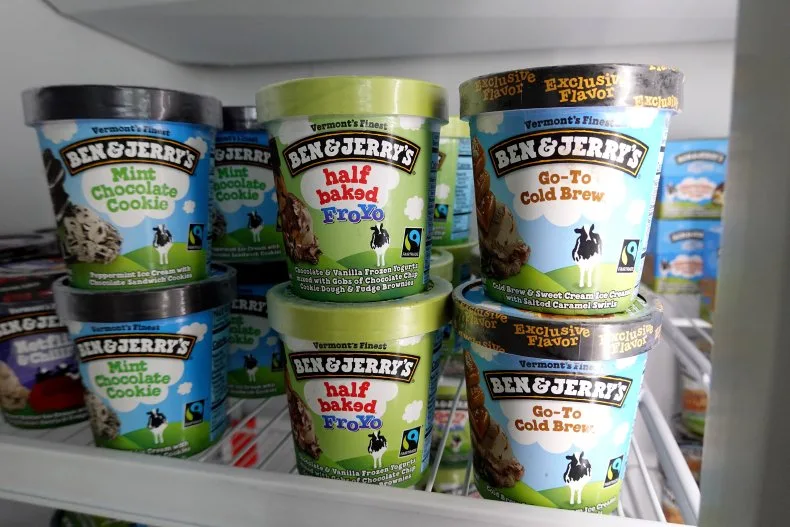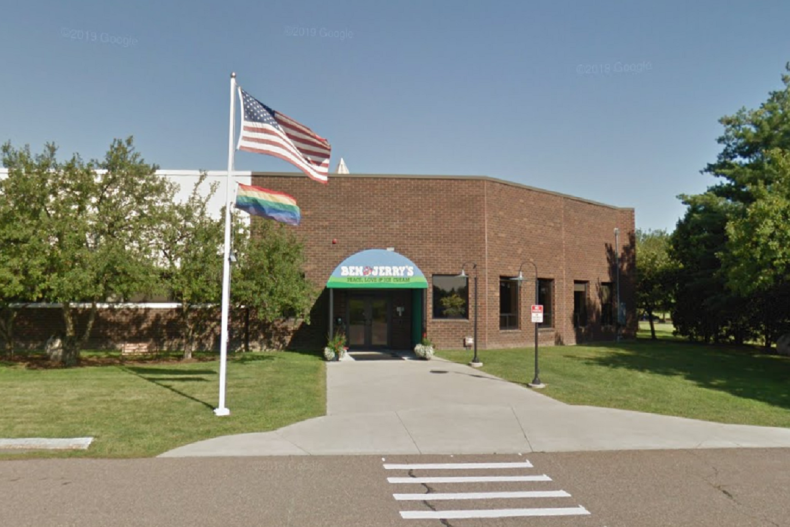A tribe descended from an Indigenous nation that once controlled a vast swathe of northeast America has called for “compensation” for the land the Ben & Jerry’s headquarters sits on after the ice cream company asked for “stolen” land to be returned.
Abenaki Band Council of Odanak, near Montreal, Canada, told Newsweek in a statement that any compensation for the company’s property should go to them and the Abenaki of Wôlinak, also in Canada, as the two recognized descendant groups.
It comes after the chief of the Nulhegan Band of The Coosuk Abenaki Nation, based in Vermont, told Newsweek it would be interested in the land being returned to Indigenous hands.
In a July 4 message, Ben & Jerry’s said the U.S. had been “founded on stolen Indigenous land” and asked others to “commit to returning it.” This prompted questions about the company giving up its Burlington, Vermont, headquarters—which sits on former Abenaki territory but is not on modern-day tribal land.

Joe Raedle/Getty Images
However, the debate over who may be the rightful owner of the ice cream company’s property has reinvigorated an ongoing dispute between tribes claiming Abenaki heritage over who should be able to claim that Indigenous heritage.
Those in Vermont have been accused by those in Canada of having no proven Native American ancestry while claiming to be of Indigenous descent, and the Odanak Abenaki appeared to deny that they should have a claim to the land.
The Abenaki Alliance, an organization representing the tribes in Vermont, responded by saying that members had met state criteria for recognition, including genealogical documents, adding that it had “never been our motivation” to seek compensation for former Indigenous territory.
Ben & Jerry’s and the Abenaki
Ben & Jerry’s has yet to respond publicly to questions about it giving up its headquarters, having focussed much of its press release on the historic claim to land of the Lakota of South Dakota. But now a second tribe has staked a claim to the company’s lot in a Burlington business park.
Following a council meeting on Monday, the Abenaki of Odanak said: “The Wôbanaki [another spelling of Abenaki] Nation agrees that there should be compensation for the land.
“However, it’s important to remember that Odanak and Wôlinak are the only two officially recognized Abenaki communities. It is therefore essential that compensation is not distributed among self-proclaimed Abenaki groups.”
Newsweek approached Ben & Jerry’s via email for comment on Thursday.
The acknowledgment of historic tribal lands is a contentious subject, pitting the claims of Native Americans, whose ancestors were subject to violent persecution and displacement, and the status quo of a modern nation with entrenched borders.
While some say colonized ancestral lands should be at least partially returned, others say that it is impossible to decide which of the various groups to have claimed land throughout history it should be returned. Disputed claims and ancestry only complicate the situation.
When asked to comment on the Odanak Abenaki statement, an Abenaki Alliance spokesperson said it was “unfortunate that a legal entity outside of the United States would insert itself into another country’s conversation for political and financial gain,” but denied that the Vermont tribes were themselves looking for financial gain.
They said the four tribes “are in a position of responsibility for Native issues that involve homelands within Vermont” and Ben & Jerry’s July 4 message “involved a Vermont-based corporation on Abenaki homelands now known as Vermont.”
Who are the Abenaki?
The Abenaki—a confederacy of several tribes who united against encroachment from a rival tribal confederacy—once controlled an area that stretched from the northern border of Massachusetts in the south to New Brunswick, Canada, in the north, and from the St. Lawrence River in the west to the East Coast.
According to historical records, the Abenaki initially traded with European settlers in the 16th century, before allying with French colonizers against English settlers in growing territorial disputes. Many fled to what is now Canada following a series of defeats at the hands of the English.
But the Abenaki were not confined to Vermont, and the settlement at Odanak, though now less than seven square kilometers, is believed to have emerged in the late 1670s.
“Odanak has been the base of and the center of Abenaki life for a steady period of over 400 years,” a University of Vermont historian, who spoke on condition of anonymity for fear of reprisal, told Newsweek. “And if we’re talking about the actual descendants of the Abenaki people of western New England, we’re talking about Odanak and to a lesser extent Wôlinak.”
Since 2012, there are now four state-recognized tribes that comprise the Abenaki Alliance in Vermont, of whom one has stated their interest in Ben & Jerry’s property. But in expressing an interest of their own, the Abenaki of Odanak have denied this claim by denying the Vermont tribes’ ancestry altogether.
Ice Cream Becomes Identity Dispute
On July 6, Don Stevens, chief of the Nulhegan Band, told Newsweek it was “always interested in reclaiming the stewardship of our lands,” but that it “has not been approached in regards to any land back opportunities from Ben & Jerry’s.”
Yet the Abenaki of Odanak has said, without naming them, that they don’t think the Vermont tribes should be approached at all.
“These groups have never been able to demonstrate that they are Abenaki,” the statement from the tribe’s council said. “It’s true that the State of Vermont has recognized them, but this decision was made without the genealogical process. The communities of Odanak and Wôlinak are the only official representatives of the Wôbanaki Nation.”
People who falsely claim Indigenous identity are pejoratively referred to as “pretendians” or “wannabes.” The practice is typically associated with cultural and financial motivations but is seen by some as a form of colonization.
In May, an anthropology professor at the University of California, Berkeley admitted in an open letter that she had claimed Native American heritage “without seeking out a documented connection” to the Mohawk and Mi’kmaq tribes. Elizabeth Hoover said doing this “gave me access to spaces and resources that I would not have otherwise.”
Asked explicitly if the Vermont tribes were “pretendians” in a frequently asked questions section on its website, Abenaki Heritage, an organization comprised of the two Canadian tribes, says there are “individuals within these groups who have true ancestry from Odanak” but that “most claim French-Canadian ancestry to justify their Indigenous lineage.”




The local historian said that the “near totality of the members of the Vermont tribes have no, bear no Abenaki ancestry,” and those who do “provide a small fig-leaf of legitimacy.” Meanwhile, he said that “there is no dispute that the Abenaki of Odanak First Nation are the Abenaki.”
The University of Vermont scholar said the local claims of Abenaki heritage had emerged in the 1970s from families of French-Canadian descent at a time when the Civil Rights and counter-culture meant “it became cool to be Native.”
He said that they claimed to have previously “blended in” to hide their true identity, but added: “No scholar has seen or shared any evidence to suggest that any coherent community—or any community—of Abenaki remained in Vermont after 1800 and through the 1960s.”
The Abenaki Alliance spokesperson told Newsweek that Indigenous communities in the U.S. and Canada “live under different recognition guidelines” and stressed that the tribes in Vermont “have met the state’s requirements for recognition, including records of kinship and ancestry through genealogical documents.”
“We are not here to divide and profit,” they said, adding contrast to Stevens’s earlier comments: “Our Vermont state recognition specifically prohibits Abenaki in Vermont from land claims and entitlements—a quest for personal gain or compensation has never been our motivation.”
According to some historical records, including those of the University of Vermont, during the early part of the 20th century, a state-sponsored eugenics program in Vermont saw some Abenaki sterilized. The Nulhegan Band has described this as “ethnocide.”
But the historian rebuffed this as “a marvellous, dark and compelling fairy tale which provides a creation story for our self-identified, Abenaki, now state-recognized tribes” which had “no evidence behind it.” While the eugenics program did exist, he said, there were no documentary records of Abenaki being sterilized through it.
When asked to comment, the Abenaki Alliance spokesperson directed Newsweek to the 2021 passing of a bill by Vermont’s legislature apologizing for the eugenics program, which among various ethnic groups mentioned “persons whose extended families’ successor generations now identify as Abenaki.”

